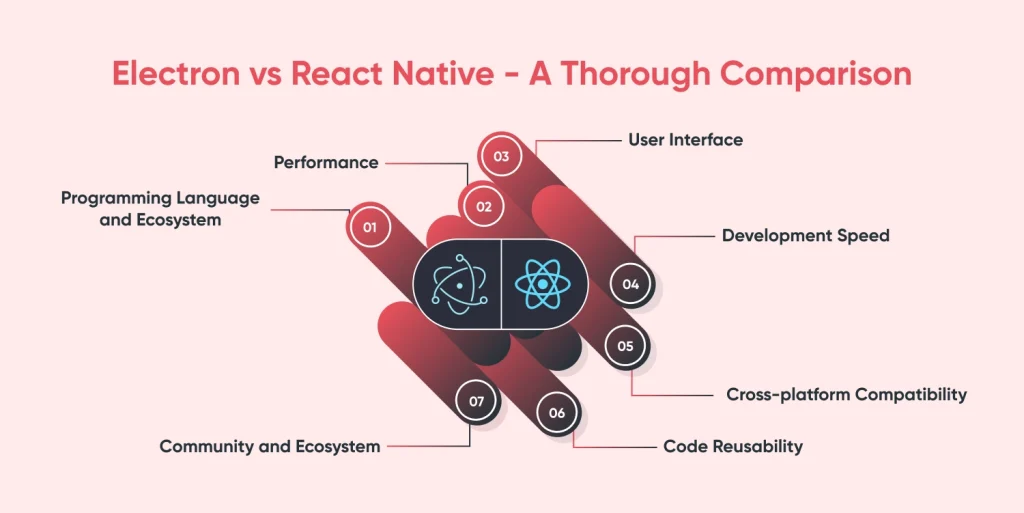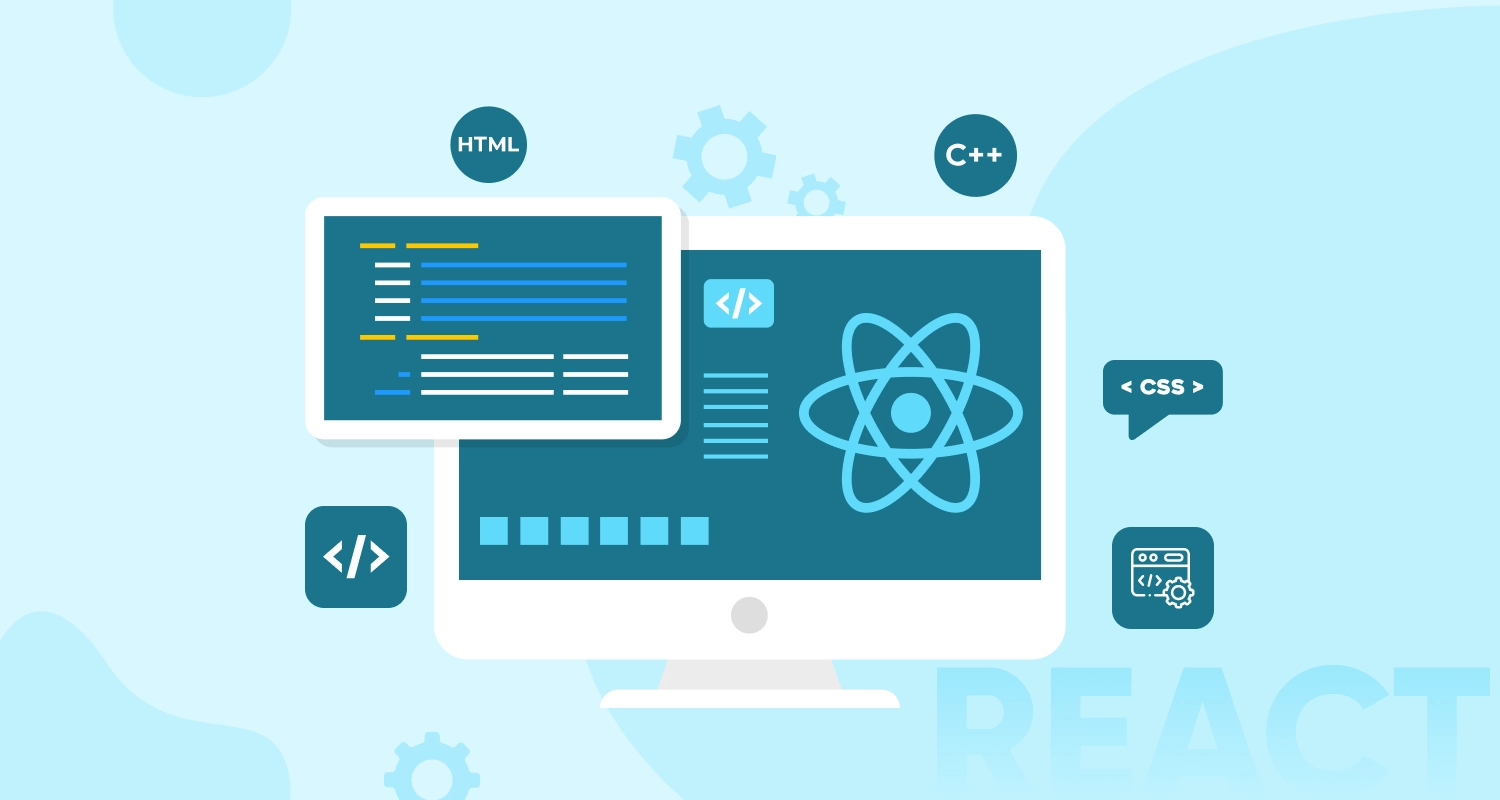Selecting the right framework for your business app development can lead to success. There are two common options: Electron and React Native. Each meets specific developmental needs and possesses unique strengths.
Electron is best suited for constructing cross-platform desktop applications with web technologies, whereas React Native app development focuses on developing mobile apps that provide a native experience across platforms.
Understanding the basic difference between React Native vs Electron will help you make wise decisions for any project with their respective specific requirements. In this blog, we will delve deeper into React Native vs Electron with clear results to help you choose the right one for your next project.
What are the Top Benefits of React Native?
The benefits of React Native app development are as follows:
Enhanced development
Cross-platform apps take less time to develop with React Native than native technologies. That’s because RN offers a plethora of ready-to-use components that can help speed up the process. The JavaScript-based framework provides access to the world’s largest package ecosystem.
Easy to learn
Most developers with React knowledge should be able to construct RN apps with ease, and vice versa. This is because many ideas and modules from both systems overlap. Thus, developers who are comfortable with one of these two environments will require less initial training when transitioning to the other.
Quick updates
Another advantage of leveraging React Native app development services is the ability to update them over the air. They enable you to deploy rapid repairs or new, minor features straight to users. In such cases, you can release them without waiting for third-party approval. OTA updates are downloaded automatically to the user’s device at the startup screen.
Application Stability
React Native allows for a streamlined data binding method, resulting in more stable applications produced with this technology. They become more dependable as a result of a solid basis. The child element makes no changes to the parent data.
Open-source
React Native for mobile apps, and Windows is free, letting developers use its frameworks and APIs without any difficulties.
What are the Top Benefits of Electron.js?
Here are the benefits of using Electron.js in comparison to React Native –
Robust data security
Developers can enable “desktop mode” in their Electron.js application if data is stored locally. If business data is housed on a cloud platform, Electron.js developers must first ensure that the platform is secure.
Reusable and compatible framework
Electron.js is used to create web and desktop applications with a single codebase. There is no need to build separate code for each platform. Electron.js is adaptable and works with different frameworks including React, Node.js, Angular.js, and Vue.
Simplified management
Because applications are developed for several platforms at the same time, each app must be tested in terms of performance and usefulness. Furthermore, Electron.js enables developers to create a single codebase for cross-platform app framework development, considerably reducing development time.
Interact with web UI/UX tools
Electron.js gives developers access to a variety of features to help with UI/UX design services that help them improve desktop programs on all platforms and create visually appealing app designs. Furthermore, because it reduces the time required to design an application, organizations may complete tasks more quickly and on budget.

Electron vs React Native – A Thorough Comparison
| Factor | React Native | Electron |
| Purpose | Mobile app development (iOS & Android) | Desktop app development (Windows, macOS, Linux) |
| Programming Language | JavaScript, TypeScript, React framework | JavaScript, TypeScript, Node.js, Chromium |
| Performance | Native-like performance using native components | Can be resource-intensive due to Chromium overhead |
| User Interface | Uses native UI components for better performance | Uses web UI components, but lacks native feel |
| Development Speed | Faster development with Hot Reloading & reusable code | Rapid development using web technologies |
| Cross-platform Compatibility | Works across iOS & Android with minimal adjustments | Single codebase for Windows, macOS, and Linux |
| Code Reusability | High, reusable code across mobile platforms | High, single codebase for desktop apps |
| Community & Support | Strong support from Facebook, large ecosystem | Strong GitHub support, growing ecosystem |
| Best for | Performance-heavy mobile applications | Cross-platform desktop applications |
Both React Native and Electron are strong cross-platform development tools, yet they serve different purposes. React Native is designed for mobile app development, whereas Electron for desktop apps concentrates on desktop applications. Let’s do a thorough comparison to understand their strengths and weaknesses across multiple aspects.

Programming Language and Ecosystem
React Native is based on JavaScript and TypeScript, and it uses the React framework as its foundation to create intuitive user interfaces. Because of the low learning curve, web developers can easily move to React Native. The best app development framework also includes tools like Expo in its extensive ecosystem, which helps with app distribution and testing.
For React Native vs Electron performance, on the other hand, Electron is built on JavaScript and TypeScript, with Node.js for backend functionality and Chromium for rendering. Electron allows developers to efficiently create desktop apps using web technologies such as HTML and CSS. Electron also offers tools like Electron Forge that help developers to manage desktop applications.
Performance
React Native apps typically produce superior outcomes since they leverage native React components for app development. The framework provides native-like performance for mobile apps, making it an excellent choice for designing apps of moderate complexity. React Native is a good choice for performance-critical mobile applications.
Electron can be resource-intensive since it runs a Chromium instance, which is essential for ensuring that the program runs smoothly in a complete web browser. Although the design increases memory consumption and can result in slower performance, the Electron framework may be a preferable solution for apps that do not require resource-intensive functions.
User Interface
React Native makes use of native UI components, allowing developers to generate user interfaces in their applications utilizing the platform’s native elements. With React Native, you get the benefits of reusable UI components to run and give better performance due to optimization.
Electron gives developers an easy way to create UI using web technologies like HTML, CSS, and JS. Electron mobile apps have a customizable user interface that makes use of a range of web UI components and modules. It provides complete design flexibility, but Electron lacks the feel of a true native desktop application development.
Development Speed
When it comes to development speed, Electron outperforms React Native thanks to its use of web technologies. Electron enables developers to use a single codebase across all desktop platforms, and its extensive ecosystem of npm libraries speeds up the process.
Similarly, when you hire React Native developers, they enable rapid development by providing capabilities like Hot Reloading and a single codebase for iOS and Android. You may need to put in more work for platform-specific customizations and native module integrations.
Cross-platform compatibility
The best feature of React Native is that it enables developers to construct a single codebase for mobile operating systems such as iOS and Android with only a few platform-specific changes. React Native supports code reusability, particularly for UI and logic, is what leads to cost-effective app development.
Electron enables programmers to create code once and distribute it smoothly across many desktop operating systems, including Windows, macOS, and Linux.
This strategy makes React Native an excellent alternative for developing cross-platform desktop apps that provide a consistent user experience across all operating systems.
Code Reusability
Another key factor to consider when comparing Electron vs React Native is code reusability. React Native excels at reusing the code for both the platforms Android and iOS. It also allows developers to leverage a single code to save time and cost in the development process.
On the contrary, Electron does not lag in providing developers with the benefit of code reuse. It allows for the development of desktop apps for Windows from a single codebase.
Community and Ecosystem
React Native has a large, active mobile development community. The popular framework also includes a large collection of third-party plugins. Supported by Facebook, React Native provides several resources, forums, and lessons to help developers get guidance and solutions.
Electron, which is supported by GitHub, has a robust and expanding community, with many dedicated developers actively contributing to its evolution. Its rich ecosystem offers an extensive collection of plugins and modules accessible via NPM. Electron is a beginner-friendly framework thanks to its vast documentation, strong focus on desktop solutions, and useful tutorials.
Why Hire Mobile App Developers from CMARIX?
CMARIX is a reputed mobile app development company with a team of dedicated mobile app developers for hire. Our team has expertise in many native and cross-platform mobile app technologies. We can deliver the best software solutions for your project.
Core Benefits of Leveraging CMARIX for Mobile App Development Services
Expertise in Cross-Platform Development
We have many developers with expertise in Electron and React Native. They ensure seamless app development services across mobile and desktop platforms. Whether you need an intuitive mobile app or a robust desktop application, we have you covered.
Agile Approach and Cost Efficiency
We follow agile methodologies to deliver projects on decided timelines and budgets. We ensure to keep the scope of the project within your set boundaries without having to compromise on quality.
Scalable and Future-Ready Hiring Options
We believe in a scale-as-you-go approach where our clients can raise requirements for additional developers or remove certain profiles from the project at any time, as per their project’s current requirements. When you hire mobile app developer from CMARIX you get effective scaling and de-scaling provisions. We make sure you only pay for what you get at all times.
Security & Compliance
Security is a top priority. We implement best security practices, including data encryption, SSL pinning, and secure authentication, ensuring compliance with industry standards.
Conclusion
React Native and Electron are two excellent frameworks for creating applications. The requirements and objectives of your project will ultimately determine which of the two app development frameworks is better for you.
We are confident that reading our React Native vs. Electron comparison guide has given you important knowledge about the advantages and disadvantages of each framework. It would be advantageous to use Electron to create scalable cross-platform desktop applications or React Native to create high-performance mobile apps.
FAQs of React Native vs Electron
What is the key difference between React Native vs Electron?
Use Electron if you want to create sophisticated desktop applications. It boasts a vibrant community and a wide range of built-in features. Secondly, React Native offers a robust component architecture and the ability to reuse code for both desktop and mobile applications.
Which framework is more cost-effective for app development?
Cost-effective app development results from React Native’s code reusability, particularly for UI and logic. On the other hand, Electron enables programmers to create code only once and have it run smoothly on many desktop operating systems, including Linux, macOS, and Windows.
Can you use Electron with React Native?
Yes, we can use both React Native and Electron as a web package to render React Native components in Electron application development. This enables you to use your existing codebase to create a cross-platform web desktop app.
Which framework is better for building desktop applications?
Depending on your requirements, you can choose the right framework. However, today, Electron is usually considered the best option for cross-platform applications on desktops due to the huge capacity of utilizing web technologies.







